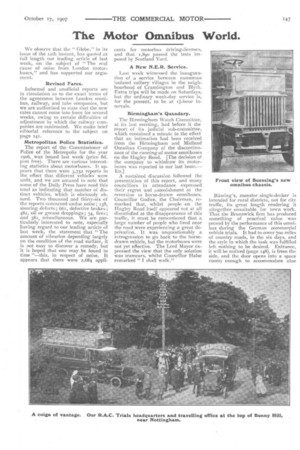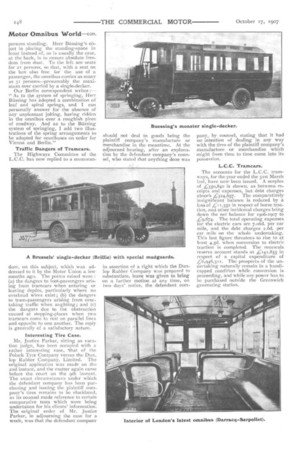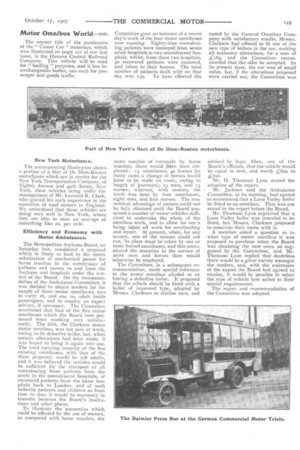The Motor Omnibus World.
Page 7

Page 8

Page 9

If you've noticed an error in this article please click here to report it so we can fix it.
We observe that the " Globe," in its issue of the 12th instant, has quoted at full length our leading article of last week, on the subject of "The real cause of noise from London motorbuses," and has supported our argument.
Revised Fares.
Informal and unofficial reports are in circulation as to the exact terms of the agreement between London omnibus, railway, and tube companies, but we are authorised to state that the new rates cannot come into force for several weeks, owing to certain difficulties of adjustment by which the railway companies are confronted. We make brief editorial reference to the subject on page 141.
Metropolitan Police Statistics.
The report of the Commissioner of Police of the Metropolis for the year 3906, was issued last week (price 8d. post free). There are various interesting statistics about motorbuses. It appears that there were 3,752 reports to the effect that different vehicles were unfit, and we are amused to note that some of the Daily Press have read this total as indicating that number of distinct vehicles, which is obviously absurd. Two thousand and thirty.six of the reports concerned undue noise; 158, steering defects ; 661, defective brakes ; 482, oil or grease droppings ; 34, fires ; and 381, miscellaneous. We are particularly interested to note, especially having regard to our leading article of last week, the statement that " The amount of vibration depending largely on the condition of the road surface, it is not easy to discover a remedy, but it is hoped that one may be found in time "—this, in respect of noise. It appears that there were 2,684 appli
cants for motorbus driving-licenses, and that 1,8go passed the tests imposed by Scotland Yard.
A New N.E.R. Service.
Last week witnessed the inauguration of a service between numerous isolated colliery villages in the neighbourhood of Cramlington and Blyth. Extra trips will be made on Saturdays, but the ordinary week-day service is, for the present, to be at IL-hour intervals.
Birmingham's Quandary.
The Birmingham Watch Committee, at its last meeting, had before it the report of its judicial sub-committee, which contained a minute to the effect that an intimation had been received from the Birmingham and Midland Omnibus Company of the discontinuance of the running of motor omnibuses on the Hagley Road. [The decision of the company to withdraw its motorbuses was reported in our last issue.— ED. j A sustained discussion followed the presentation of this report, and many councillors in attendance expressed their regret and astonishment at the reversion to horse-drawn omnibuses. Councillor Godlee, the Chairman, remarked that, whilst people on the Hag-ley Road itself appeared not at all dissatisfied at the disappearance of this traffic, it must be remembered that a large number of people who lived near the, road were experiencing a great deprivation. It was unquestionably a retrogression to go back to the horsedrawn vehicle, but the motorbuses were not yet effective. The Lord Mayor expressed the view that the only solution was tramcars, whilst Councillor liaise remarked " I shall walk."
Bfissing's, monster single-decker is intended for rural districts, not for city traffic, its great length rendering it altogether unsuitable for town work. That the Brunswick firm has produced something of practical value was proved by the performance of this omnibus during the German commercial vehicle trials. It had to cover 700 miles of country roads, in the six days, and the style in which the task was fulfilled left nothing to be desired. Entrance, it will be noticed (page 144 is from the side, and the door opens into a space roomy enough to accommodate nine persons standing. Herr Bussing,'s object in placing the standing-space in front instead of, as is usually the case, at the back, is to ensure absolute freedom from dust. To the left are seats for 21 persons, so that, with a seat on the box also free for the use of a passenger, the omnibus carries as many as 31 persons—presumably the maximum ever carried by a single-decker.
Our Berlin correspondent writes :— " As to the system of springing, Herr Bussing has adopted a combination of leaf and spiral springs, and I can personally answer for the absence of any unpleasant jolting, having ridden in the omnibus over a roughish piece of roadway. And as to the Bussing system of springing, I add two illustrations of the spring arrangements to be adopted for omnibuses on order for Vienna and Berlin."
Traffic Dangers of Tramcars. The Highways Committee of the L.C.C. has now replied to a memoran dum, on this subject, which was addressed to it by the Motor Union a few months ago. The points raised were : (a) the dangers to foot-passengers arising from tramcars when entering or leaving dep6ts, particularly where no overhead wires exist ; (b) the dangers to tram-passengers arising from overtaking traffic when alighting; and (c) the dangers due to the obstruction caused at stopping-places when two tramcars come to rest on parallel lines and opposite to one another. The reply is generally of a satisfactory nature.
Interesting Tire Case.
Mr. Justice Parker, sitting as vacation judge, has been occupied with a rather interesting case, "that of the Polack Tyre Company versus the Dun_ lop Rubber Company, Limited. The original application was made on the 2nd instant, and the matter again came before the court on the 9th instant. The exact circumstances under which the defendant company has been purchasing and issuing the plaintiff company's tires remains to be elucidated, as its counsel made reference to certain comparative tests which were being undertaken for his clients' information. The original order of Mr. Justice Parker, in adjourning the case for a week, was that the defendant company
should not deal in goods being the plaintiff company's manufacture or merchandise in the meantime. At the adjourned hearing, after an explanation by the defendant company's counsel, who stated that anything done was in assertion of a right which the Dunlop Rubber Company was prepared to substantiate, leave was given to bring on a further motion at any time, on two days' notice, the defendant corn patty, by counsel, stating that it had no intention of dealing in any way with the tires of the plaintiff company's manufacture or merchandise which might from time to time come into its possession.
L.C.C. Tramcars.
The accounts for the L.C.C. tramways, for the year ended the 3ist March last, have now been issued. A surplus of L35(3,840 is shown, as between receipts and expenses, but debt charges absorb -,..4-324,657. The comparatively insignificant balance is reduced by a loss of L,t 1,352 in respect of horse traction, and other incidental charges bring down the net balance for 1906-1907 •to ,4:9,674. The total operating expenses for the electric cars are 7.o6d. per car mile, and the debt charges 2.6d. per car mile on the whole undertaking. This last figure threatens to rise to at least 4.511. when conversion to electric traction is completed. The renewals 'reserve account stands at .,:',14.1,855 in respect of a capital expenditure of X.76,946,3if. The prospects of the undertaking naturally remain in a handicapped condition while conversion is proceeding, and while any power has to be purchased outside the Greenwich generating station. The correct title of the purchasers of the "Corner Car " motorbus, which was illustrated on page 121 of our last issue, is the Havana Central Railroad Company. This vehicle will be used for" feeding " purposes, and it has interchangeable bodies, one each for passenger and goods traffic.
Committee gave an instance of a recent day's work of the four motor omnibuses now running. Eighty-nine convalescing patients were conveyed from seven acute hospitals to two convalescent hospitals, whilst, from these two hospitals, 50 recovered patients were removed, and taken to their homes. The total number of patients dealt with on that day was 139. To have effected the tested by the General Omnibus Company with satisfactory results. Messrs. Clarkson had offered to fit one of the new type of boilers to the car, making all necessary alterations, for a sum of ,165, and the Committee recommended that the offer be accepted. In its present state, the car was of small' value, but, if the alterations proposed were carried out, the Committee was






























